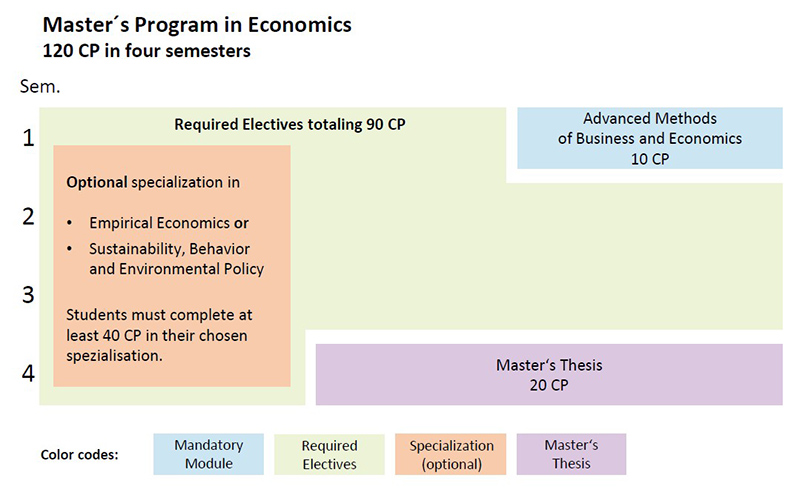Main content
Top content
Economics - Master of Science

Facts
Standard Program Duration:
4 Semesters
Language of Instruction:
English
Program Commencement:
Winter and summer semesters
Qualification:
Master of science (M.Sc.)
What are the key features of this program?
The Master's program in Economics at Osnabrück University is distinctive for its combined approach, offering students a broad-based education in Economics whilst also providing them with opportunities for individual specialization. The program offers a wide range of advanced modules in fields as diverse as Microeconomics, Macroeconomics, Public Finance, International Economic Policy, Statistics/Econometrics, and Environmental Economics.
The Master’s program in Economics has adopted the English language as its language of instruction, with some electives offered in German. Applicants to the program are not required to demonstrate proficiency in the German language. Depending on their subject combinations, students have the option of choosing a specialization in Empirical Economics or in Sustainability, Behavior and Environmental Policy:
Empirical Economics
Modern Economics is increasingly using empirical methods in its research. The School of Business Administration and Economics is particularly strong in this field, with the three Chairs of Macroeconomics, International Economic Policy and Statistics/Econometrics all taking an empirical approach. Together, they make up the Institute of Empirical Economic Research.
Our specialization in empirical Economics offers students research-based teaching which provides them with both a solid methodological foundation in the fields of statistics and econometrics as well as a practical focus in their education, in which they examine a number of key economic policy issues. One distinctive aspect of the program is students’ involvement in independent empirical research, which allows them to carry out their own statistical inferences, for example in the context of a broader project seminar.
Sustainability, Behavior and Environmental Policy
This specialization is directed at students interested in understanding the connection between environmental issues, human behavior and economics, in familiarizing themselves with and discussing potential solutions, and who are looking to make a personal contribution to steering society towards greater sustainability in their future careers.
The unique feature of this specialization lies in its combination of Environmental Economics with findings from Behavioral Economics. The latter lies at the nexus between Economics and Psychology and goes beyond the traditional model of the homo economicus to pave the way for a broader understanding of human behavior, for example by accounting for constraints on rationality and willpower, for the role of values and social norms, and innovative political instruments such as so-called “nudges”. At the same time, Environmental Economics offers important insights into the role and design of economic incentive tools in environmental policy (e.g., CO2 pricing) and the correlation between economic growth, resource consumption and environmental quality. Of course, the transformation to sustainability also requires students to possess a solid understanding of our economic system.
What career prospects does this degree offer me?
Economists have a wide range of careers open to them. They are always in demand in fields which require in-depth knowledge of economic behavior and any resultant long-term forecasting. Potential employers include consulting agencies, or strategy and sustainability departments in companies and banks. Economists are also sought-after in government ministries and other public institutions, as well as in research institutes and international organizations. Graduates in economics are currently profiting from the particularly promising employment market situation for economists.
Graduates in economics possess an advanced understanding of micro and macroeconomic processes. Whatever career path graduates choose depends on their analytical abilities, their individual interests and their specializations in their studies. Some graduates choose to work for companies analyzing current market conditions or developing new business strategies; others choose a career which enables them to better regulate economic life and increase sustainability.
How is the program structured?
The standard duration of the Master’s program in economics is four semesters, consists of 120 credit points (CP) and qualifies graduates to bear the title “Master of Science (M.Sc.)”.
Students have the option to choose between two specializations – Empirical Economics and Sustainability, Behavior and Environmental Policy.
Model Program Plan:

Of the 120 CP that students are required to earn during their studies, 10 CP are awarded for the mandatory component, 90 CP for the required electives component, and 20 CP for the Master’s thesis.
In the mandatory component, students take the module “Advanced Methods of Business and Economics” for 10 CP. This module provides students with advanced knowledge and skills in the microeconomic analysis of key issues pertaining to business, economics and econometric analysis, and teaches them how to apply these to concrete examples. Depending on when students commence their studies, they will take the mandatory module either in their first or their second semester. The diagram shows the structure of a course of study which commences in the winter semester.
Of the 90 CP students must earn in the required electives component, they should take at least 60 CP in Economics and Quantitative Methods and at least 10 CP in Business Administration. The remaining 20 CP may be earned either in Economics or Business Administration or in neighboring disciplines. The modules in the required electives component may also be chosen in such a way as to place a focus on one of the two specialist fields. Overall, the required electives component is characterized by a high degree of flexibility. This allows students considerable freedom to pursue their own interests and professional goals in the course of their studies.
Download: Model Program Plan (PDF, 302 kB)
The examination regulations provide reliable answers to questions about the program structure, examinations to be taken, the final thesis, certificates and many other aspects of the program.
What are the admission requirements?
Applicants must have completed a Bachelor’s degree in a relevant subject or a subject closely related to the field to a total of at least 180 CP. The regulations on access and admission for the Master’s program provide detailed information on the prior knowledge applicants must have acquired in order the qualify for admission.
In particular, applicants must have earned
- 15 CP in Mathematics, Statistics or Econometrics of which at least 8 CP must be in Statistics or Econometrics, and
- 25 CP from the field of Economics.
Applicants must also demonstrate English language proficiency to B2-level in accordance with the Common European Framework of Reference (CEFR). Particulars are governed by the regulations on access and admission. Applicants are not required to demonstrate proficiency in the German language.
Important: Together with their applications, applicants should - where possible - include a permanent Internet address containing the module descriptions for their completed Bachelor’s degree courses (in the case of module descriptions from non-German universities applicants should include translations in German or English). If applicants are unable to provide an Internet address, then they may upload a PDF file containing the necessary information.
The module descriptions are important for establishing program compatibility particularly in cases where the Bachelor’s degree certificate does not contain the exact term “Economics”.
Applicants may submit an application immediately prior to finishing their Bachelor’s degree (they must submit proof of having completed 150 CP).
For additional information on admission requirements, please refer to the Regulations on Access and Admission.
How do I apply?
Please check well in advance if there are any potential admission restrictions and application deadlines for this program.
German citizens in possession of German certification (Abitur) may apply directly using Osnabrück University’s online portal. This is also the case for international applicants in possession of German certification.
International applicants in possession of non-German certification should apply using the service agency uni-assist.
Applicants are required to upload the following documents to the online application portal:
- Bachelor’s degree certificate and/or a transcript of records showing they have completed 150 CP
- Proof of English proficiency
- Module descriptions (if possible)
- A personal statement that they have not already completed a comparable Master’s program, and that they have not definitively failed a comparable Master’s program or have not lost their entitlement to take examinations.
The Regulations on Access and Admission contain information about further documents to be uploaded.
Is there a period of study abroad?
The examination regulations do not prescribe an obligatory period of study abroad. The School of Economics does however support its students if they decide to complete a voluntary period of study abroad in one of the university´s various exchange programs. There is an established system for accrediting courses that students complete abroad, so that a semester abroad – provided that students plan carefully - is possible without prolonging their studies. For further particulars, please refer to the International Office.
How can I find out more?
Study Counseling Service
For general information on studying and on admission requirements, please enquire at the Study Counseling Service Osnabrück or contact studentsoffice@uni-osnabrueck.de.
Specific questions regarding the program structure and the content of the program should be addressed to the Departmental Study Counseling Service Fachstudienberatung.
Additional Programs of Study
Related Links
Quality Assurance
This program of study has been accredited by the German Accreditation Council.




